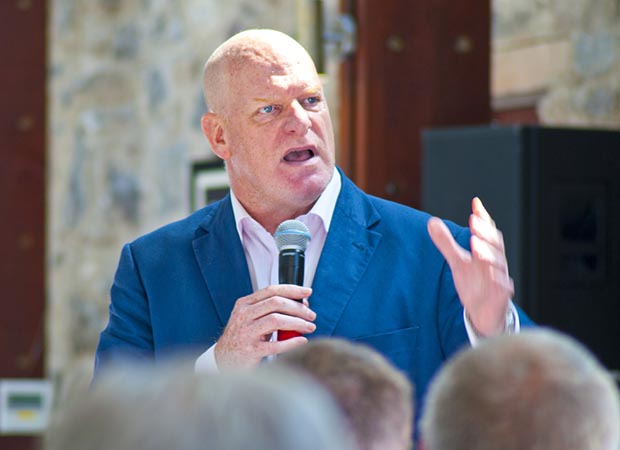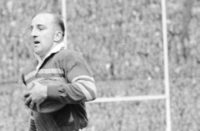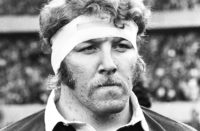 Phil Steele has earned himself a rewarding reputation as a technical-zone television reporter and after-dinner speaker, a veritable bundle of laughs.
Phil Steele has earned himself a rewarding reputation as a technical-zone television reporter and after-dinner speaker, a veritable bundle of laughs.
A schoolteacher by profession, a full- back at Newport by choice, and an all-round good bloke by the grace of God, he has used those earlier incarnations as a means of mining a seam rich enough to fuel a high-octane brand of self-deprecating humour.
He has done all that despite a mental illness that tortured him into thinking about taking his own life. Tomorrow he launches an autobiography, Nerves Of Steele published by St David's Press, in which he reveals, among other things, how depression drove him into a suicidal state of mind.
Steele would be embarrassed at being mentioned in the same sentence as timeless funny men of global renown such as Tony Hancock and Phil Silvers of Sergeant Bilko fame, but they, too, suffered from depression. Steele talks about “four-and-a-half months of pure hell” from autumn 1984 to mid-winter 1985 when injury finished him as a player.
“The demons inside me came alive and were having a 24/7 non-stop party,” he says. “They moved in and refused to leave. It got so bad I couldn't sleep. I became anxious about the slightest thing and I started to cry a lot.
“Stupid, irrational thoughts popped into my head. I understand that people who suffer from schizophrenia hear voices in their heads. I didn't have voices but I had distorted thoughts, terrible thoughts about something bad happening to Liz (then his fiancée) or my parents.
“I'm not ashamed to say that I cried every morning before going to school. The irony of a teacher, not a pupil, crying about going to school was not lost on me.
“I slowly changed from being a colourful character to a grey, lifeless shell. All the joy was being sucked out of me. I cried between lessons. I'd shut the door of my office and sob and sob until I was empty.
“My nerves seemed to be out of control. My insides felt as though they were bouncing up and down on a big trampoline. Then things got darker, a lot darker.
“I had my first suicidal thought in early 1985 when I was doing a spot of coaching with my local club, Caerau Ely. One night, while the players were doing some warm-ups, I had the scariest of thoughts:
‘There's no point in all this, is there? What's the point of going on? Wouldn't you and everyone else be better off if you weren't here anymore? Isn't it time to….you know…just end it.'
“The shocking thing was it wasn't a shock. It seemed the most natural thing to do. To make matters worse the words spinning around my head sounded more sinister than the ones before. My depression knew it was planting the ‘suicide seed' in my mind.
“I heard it as a deep voice, an older, all-encompassing voice, whispering in my head. It was as if my depression was trying to help me do the obvious and reasonable thing.
“It was a horrible feeling and although I knew it was wrong and I didn't want to do it, my mind didn't want to battle against it. I now understand, from my research into depression and speaking to other sufferers, that people who commit suicide, or attempt to do so, have come to believe that it is the only viable option left open to them.
“My depression was like a skilful cowboy hanging onto a bucking horse at a rodeo. No matter how hard I fought, it was always there, waiting for the next opportunity. Even writing this now, I physically shiver at the thought of what I could have done.
“The most important reason why I wanted to write this book was to see if my story would in any way help other individuals who are also suffering from this terrible illness. To give them hope that all is not lost and that they can get through it and come out the other end intact.
“Now I accept that I have a susceptibility to depression and I'm relaxed about it. I'm not boasting about it but I'm not hiding it either. I'm Phil Steele and I suffer with depression but I'm still here and I'm still me.”
There is only one word left to be said: Hallelujah.


























